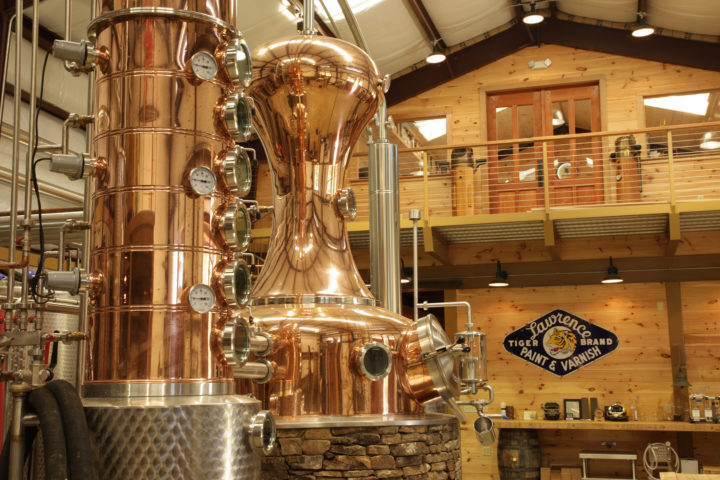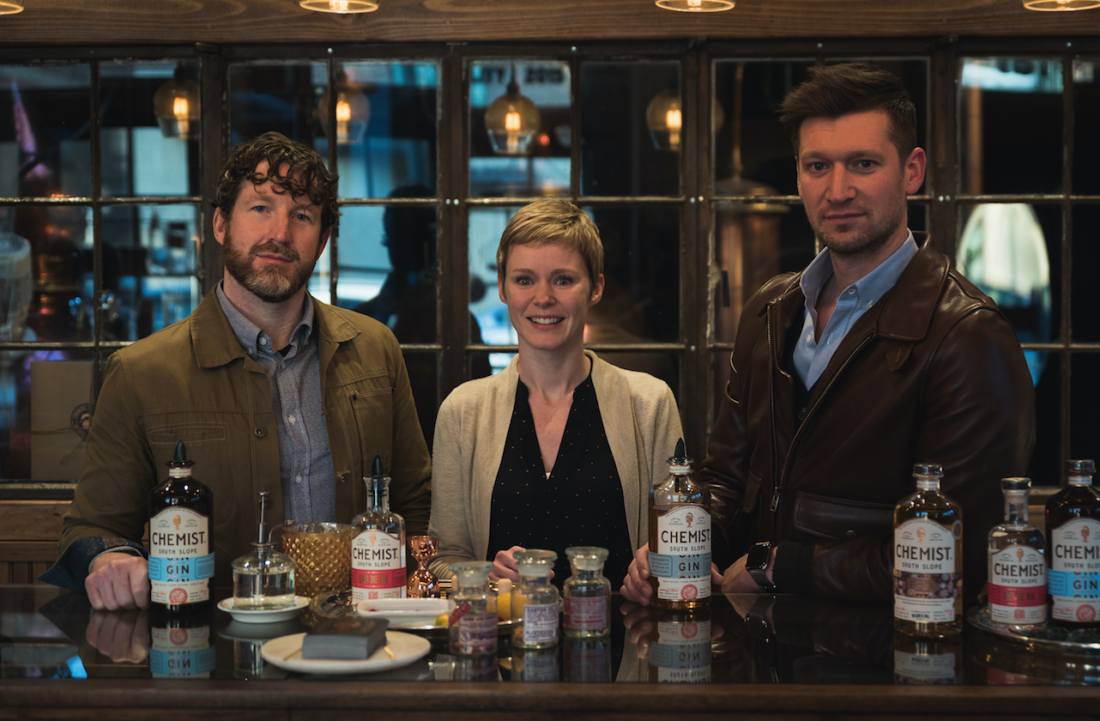In 1986, Weeping Radish in the Outer Banks became the first modern microbrewery to open in North Carolina. Highland Brewing Co. followed eight years later, kicking off the Western North Carolina beer scene, which has driven the state to emerge as one of the fastest-growing beer industries in the country.
By comparison, North Carolina’s first craft distilling company, Piedmont Distillers, opened in Rockingham County circa 2005. But beyond the reality that the development of North Carolina’s craft spirits scene is chronologically 20 years behind beer, some local distillers argue that the state’s liquor laws are drastically inhibiting the growth of the fledgling industry.
North Carolina has some of the strictest liquor laws in the United States, in large part due to the state-run monopoly on sales of spirited drinks. As The News & Observer noted in an August report, “The battle over who gets to sell liquor, plus when and where, has been going on for decades. Right now, the state controls every aspect of the liquor business, from the hours (closed all day on Sunday and at 9 p.m. every other day) to the prices (higher than in many other states).”
North Carolina is one of 17 states that bans privately run liquor stores, a fact bemoaned by some in the craft spirits industry, but one that Mark Combs, Asheville Alcoholic Beverage Control general manager, says is a complex subject. “North Carolina is unique in that 167 communities own their liquor stores. Back in 1937, the legislature voted to let each community choose whether or not they want spirits to be sold in their communities,” he explains. “No tax dollars are used in the operation of the system. Asheville’s ABC system is owned by the city of Asheville, and all our profits go back to the community.”
In addition, only five bottles of liquor can be sold directly by a distiller to a consumer per 12-month period (prior to passage of the Brunch Bill in 2017, the limit was just one bottle per year, and before 2015, it was zero), liquor cannot be shipped to consumers either inside or outside the state, permits are required for sales at festivals or events, no tastings can be offered at ABC stores, no sales of mixed cocktails are allowed on-site at distilleries without a vendor’s permit, and self-distributing to bars and restaurants is prohibited.
State control of pricing, including a local markup determined by the ABC Commission, bailment and bottle charges and state excise tax, is also problematic for many craft distillers, as are statute stipulations, such as the requirement that the ABC maintain a law enforcement component and give 7 percent of its profits to alcohol and drug education and treatment grants. “The beer and wine industries have none of these constraints put on them,” says Combs.
Hamstrung
Since 2015, the number of craft distilleries in WNC has mushroomed from just two to 10 (including Blue Ridge Distilling Co. in Rutherford County and Elevated Mountain Distilling Co. in Haywood County). But many Asheville-area distillers find the state’s legal limitations to be a source of endless frustration — especially in light of the much looser, business-friendly craft beer laws.
Adam Dalton, owner of Dalton Distillery on Biltmore Avenue, believes that just one change could make a huge difference to his bottom line: the ability to sell and deliver straight to bars and restaurants. “If we could do our sales pitch then follow up with bringing the products that same trip or when it was convenient for the customer, I think we could gain more accounts,” he says.
Combs doesn’t see the prohibition on direct sales as a significant hurdle, however. “Local distillers or their representatives can indeed hustle and go to restaurants, create a relationship with the buyers, promote their products, let them taste their product, leave samples, etc.,” he says.
However, he notes that sometimes bar managers will indicate to the distiller that they plan to order a product from the ABC, then not follow up on that for whatever reason. “In turn, the distiller often thinks my ABC system has refused to carry their products [for sale] because they mistakenly believed barkeeps ordered it and we refused to get it. This is simply not true. We will gladly stock products our mixed beverage customers want, and we stock it for walk-in customers, too, if there is demand for it. If buyers want their product, trust me, my store managers will order and stock all the product they want.”
Rett Murphy of Eda Rhyne Distilling Co., which began distilling and marketing its fernet, amaro and nocino in 2017 in Biltmore Village, puts it bluntly: “The entire ABC system is holding us back. None of their decisions are based around what is best for the consumer. We absolutely would not have a craft beer scene if beer was controlled the same way.”
He points out that the state has the fifth-highest liquor taxes in the country. “They make a lot of money selling liquor. But if some laws changed and allowed us to sell more products, they would recoup some of that in excise taxes and income taxes from employees and business owners,” he says.
Strong support of everything small and local in Asheville has resulted in 96 percent of metro-area businesses employing 50 or fewer people, remarks Leah Howard, co-owner of H&H Distillery, which launched in Fairview in 2015. And for her, this statistic from the Asheville Area Chamber of Commerce indicates that “there is is a craving for something genuine and wholesome when tourists are choosing their vacation destinations.”
Of course, many distilleries in the region are bare-bones operations, with the owners working other jobs or running a separate bar, leaving little time for marketing, events and chasing down new accounts. And this presents yet another obstacle for craft distillers.
“Many Asheville locals, including restaurant owners, actually don’t realize there are local craft liquors to be offered,” Howard points out. “While this may mean the playing field is wide open, it also means the bleachers won’t be full for quite some time.”
Combs says that although the law prevents North Carolina’s 167 independent ABC systems from advertising liquor products in any way, they still do their best to help spread the word to consumers about the availability of locally made spirits. “We maintain a special shelf [in our stores] for North Carolina distillers and often work with local distillers to feature their products, such as special end-cap displays, signings, free-standing racks, etc. Our store staff verbally promotes local products as well.”
Loosening the grip
Progress was made on the federal level for leveling the playing field among distillers, brewers and vintners, when the U.S. Congress passed the Craft Modernization and Tax Reform Act in 2017, reducing the federal excise tax for spirits from $13.50 to $2.70 per gallon for the first 100,000 proof gallons removed from bond per year for a two-year period. Mark Shilling, president of the American Craft Spirits Association, called this the “largest legislative victory for our industry in modern history.”
And on the state level, the 2017 passage of the Brunch Bill loosened some restrictions on distillers, upping the number of bottles per customer they can sell directly from the distillery from one to five per year and allowing them to hand out product samples at events and festivals.
The movement toward more reasonable and fair laws among the craft beverage industries will certainly help increase the number of entrepreneurs willing to open small distilleries, the number of which grew by 15.5 percent in 2018 in the U.S. to 1,835 and is expected to hit 2,000 by 2020. Nationally, craft spirit sales reached $3.7 billion in sales in 2017, up 30 percent from 2016.

Also indicating growth in the industry, DistilleryTrail.com’s website traffic increased over 61 percent from 2017 to 2018. And while sales of craft spirits have doubled over the past five years, the fact remains that this category only makes up about 2.8 percent of overall spirits sales, while craft beer makes up 23 percent of the total U.S. beer market. So, undoubtedly, craft spirits can take away a larger chunk of the market from the macrodistillers over time, just as craft beer has done.
However, Brandon Horne, co-founder of Apothecary Beverage Co., which opened its The Chemist distillery on the South Slope in June followed by the Antidote cocktail bar this winter, points out that it’s important to keep the comparisons in perspective. “The overall beer market is around $111 billion in the U.S., while spirits in total make up only about as much as the craft segment of that — around $26 billion,” he says. “But within that is a much broader number of products and types of products overall compared to where the beer market was at this stage in its craft boom.”
With by-the-bottle sales reaching over $1 billion just in North Carolina in 2017, a growing number of politicians are recognizing a need for change in the state’s liquor laws, including N.C. Rep. Chuck McGrady of Hendersonville, chair of the N.C. House of Representatives ABC Committee, who told The News & Observer in August that he “would like to see us go free-market.”
Since North Carolina’s craft beer market was unleashed in 2005 with the raising of the legal cap on alcohol content, the state now ranks eighth in the nation with 257 craft breweries and 10th in the economic impact of craft beer, according to the Brewers Association. Looser liquor laws could help North Carolina gain traction as a destination for craft spirits, too.
Lauren Ferris, co-owner of Blue Ridge Distilling Co., which produces Defiant Whisky in Bostic, believes North Carolina should embrace the tax revenue possibilities that more tourism-friendly liquor laws would generate. “The best example we have of what increasing on-site distillery sales could do for our state, our business and brand awareness globally is the Bourbon Trail in Kentucky,” she says. “They have created an incredible tourism draw to their state. Kentucky bourbon contributes $8.5 billion to their economy, draws over 1 million visitors to the state annually, creates 17,500 jobs and generates $825 million in tax revenue. The distilled spirits boom that is happening right now is an incredible opportunity to enhance our local economy and put North Carolina on the global distilling map.”
Ferris also believes that allowing out-of-state online sales and shipping would further feed the tourism loop, as customers would make the pilgrimage to visit their favorite North Carolina distilleries, pumping more money into the state’s economy. Combs points out that distilleries can, in fact, choose to operate their distillery as a drinking destination, where customers can take tours, do tastings and have mixed drinks and food. “They can get a permit from the ABC Commission to serve mixed drinks and operate under a license. The breweries do this,” he says.
“Of course, since there are technically no bars in North Carolina at this time, it would need to have a restaurant component to get such a permit,” he adds. “The food requirement is indeed pernicious to many who come from states which allow bars.”




Though the headline could be thought of as being somewhat biased toward the distilleries, this is another very informative and interesting article on many levels, distilling economic, state and local governance, entrepreneurship, and human interest into one fine story.
AND, Ms. Russell did an admirably job of presenting all sides, without succumbing to imposing her own feelings onto the reader.
If only our main stream media professionals could bring themselves to do the same, our country would not continue to dissolve into divisiveness.